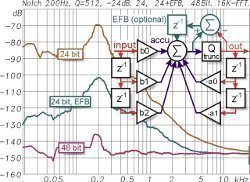An IIR (Infinite Impulse Response) filter is a foundation element in Digital Signal Processing (DSP). It is one of two types of digital filters used in DSP applications and is an alternative to Finite Impulse Response (FIR) filters. The response in IIRs is considered infinite since there is feedback in the filter and they may be either analog or digital. IIRs are more efficient than FIRs for narrow transition bands, but it takes more time and money to develop a new IIR filter depending on the application.
What are the Advantages of IIR Filters?
IIR filters can achieve their designed filtering characteristics by using fewer calculations and less memory than FIR filters. They outperform other filters for narrow transition bands. They also provide a better approximation for traditionally analog systems in digital applications than competing filters.
What are the Disadvantages of IIR Filters?
IIR filters have several disadvantages, which include: being harder to implement with fixed-point math, not offering the computational advantages that FIR filters do for multi-rate applications, being more susceptible to the noise that limit cycles and calculations generate. Due to the lack of design information for digital IIR filters, a corresponding analog design is usually completed first for new filter designs. Once created and tested, the corresponding digital filter is made, which results in additional overhead costs for making a new IIR digital filter.
How are IIR Filters Used?
IIR filters are typically used in systems that use digital signal processing. IIR filters include the Butterworth, Bessel, and Chebyshev filters. These filters are typically used in audio applications such as speakers and for sound processing functions.




Follow Us!